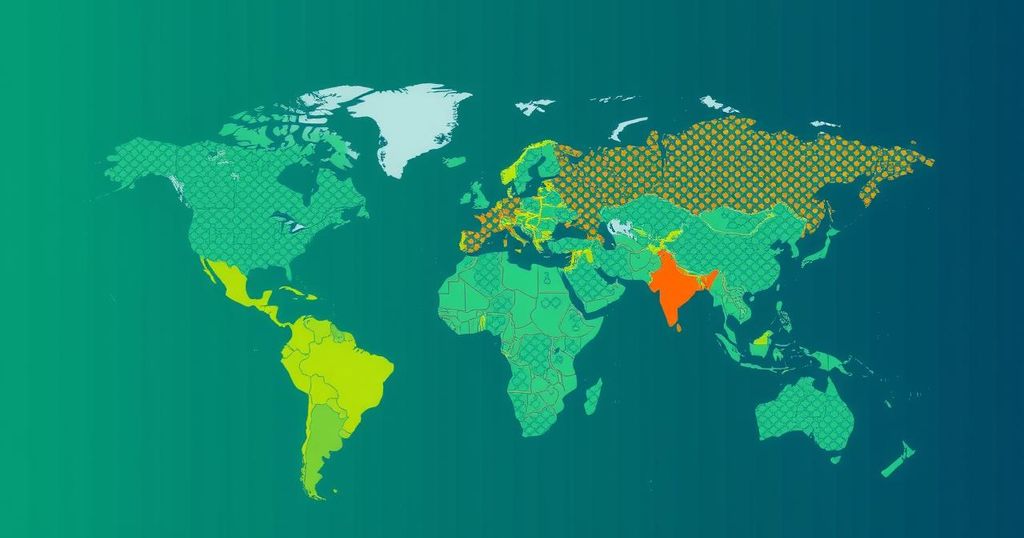Global Elections in 2024 Indicate Diminishing Commitment to Climate Action
The 2024 election cycle has seen a concerning decline in global commitment to climate action, even as climate-related disasters become more frequent. Key victories for climate-skeptical politicians indicate a shift away from prioritizing climate policies, overshadowed by rising inflation and economic anxieties. While some regional successes for climate-centered parties exist, the overall political momentum to tackle climate change has weakened significantly, culminating in a notably ineffective Cop29 summit.
The year 2024 is being characterized as an unprecedented electoral year, with significant implications for climate policy worldwide. Despite alarming climate crises and extreme weather events, the commitment to address climate change appears to be diminishing in numerous countries. Prominent victories for climate skeptics, including the US president-elect Donald Trump and right-wing parties in Europe, have indicated a troubling trend where climate concerns are sidelined in favor of inflation and energy issues.
Catherine Fieschi, a noted expert in European politics, remarked on the stark reality that climate has suffered as a result of societal changes. Public interest in climate action has been significantly diminished over the past few years due to competing challenges such as the pandemic, geopolitical conflicts, and economic anxieties. Fieschi noted that the shift in political rhetoric from ‘green’ to ‘clean’ signals a broader reorientation where economic considerations overshadow climate urgency.
Despite predictions indicating this could be the hottest year on record, climate-related issues have largely remained secondary in electoral agendas, except in some regions like India where extreme weather has galvanized farmer protests. In Europe, right-wing parties dismissing climate action as fiscally irresponsible performed well during elections, while the US witnessed Trump’s distinct anti-environmental promises as he triumphed over Kamala Harris.
Nonetheless, certain regions such as the UK showed resistance against far-right narratives focusing on pluralistic climate action, with Labour’s success coming from emphasizing clean energy growth. However, there remains an overall global trend of hesitance towards committed climate action amidst dire warnings from scientists regarding critical emissions thresholds.
The conclusion of this tumultuous year was marked by a concerning Cop29 climate summit in Azerbaijan, criticized for lack attendance from world leaders and regressive attitudes towards fossil fuels. Activists have expressed frustration over the failure to advance climate commitments, especially as major polluters continue to evade accountability. Edi Rama, Albania’s prime minister, voiced incredulity at the sight of major emitting nations yet claiming leadership in climate initiatives.
As the world inches closer to critical tipping points, there is a growing consensus that the previous optimism surrounding climate efforts may be waning. Significant efforts and decisive actions are necessary to counteract the adverse effects of climate change, as delay in action poses an increasingly grave risk.
The article discusses the global political landscape in 2024, which is seen as a pivotal year for elections that could significantly impact climate action. Factors influencing this trend include the rise of climate-skeptical leaders, economic stresses from inflation, and public fatigue from recent crises including the pandemic and geopolitical conflicts. The disparity between ongoing environmental catastrophes and declining political will is a central theme, reflecting a broader societal disillusionment with climate priorities. The Cop29 summit’s backdrop, set in an authoritarian state amid rising populism, further contextualizes the challenges facing global climate negotiations.
In summary, the landscape for climate action in 2024 reveals a troubling disconnect between the increasing severity of climate crises and diminishing political commitment to address them. The electoral successes of climate skeptics and the prevailing focus on economic concerns signal a potential setback for global climate initiatives. As major emitting nations continue to evade accountability and important summits like Cop29 reflect inadequate progress, the urgency for comprehensive climate policies escalates. Long-term solutions require a renewed focus on climate priorities amidst competing socio-economic pressures.
Original Source: www.theguardian.com




Post Comment